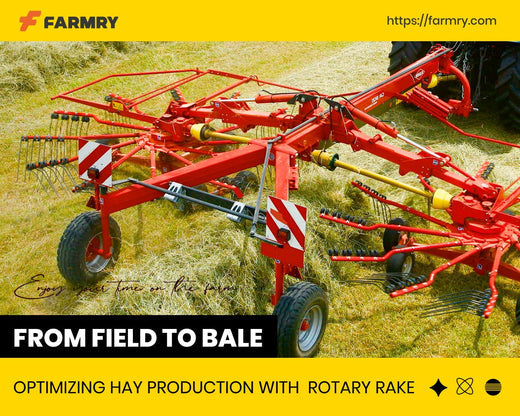What Size Wood Chipper Do I Need? The Complete Guide for Property Owners, Landscapers, and Farmers
 If you’ve ever asked yourself “what size wood chipper do I need?” — you’re not alone. From suburban homeowners dealing with garden waste to professional tree contractors handling whole trees, the right wood chipper makes all the difference.
If you’ve ever asked yourself “what size wood chipper do I need?” — you’re not alone. From suburban homeowners dealing with garden waste to professional tree contractors handling whole trees, the right wood chipper makes all the difference.
At Farmry, we understand that choosing between electric wood chippers, gas powered wood chippers, or even PTO-driven machines with diesel engines can feel overwhelming. That’s why we’ve built this guide — to help you match your yard size, your material type, and your work frequency with the perfect Farmry chipper.
Whether you’re tackling small branches, light brush, or larger branches inches in diameter, we’ll help you find the right chipper that saves time, avoids wasting fuel running, and maximizes overall productivity.
Why Wood Chipper Size Matters
Not all chippers are created equal. The right wood chipper size affects:
-
Chipping capacity: The maximum diameter of thick branches or fallen branches you can feed.
-
Power source: Choosing between electric wood, gas engines, diesel engines, or power take off (PTO).
-
Efficiency: A bigger machine may process large volumes but also comes with additional fuel costs and requires larger trucks or trailers.
-
Safety: Using the wrong machine can lead to clogging, dangerous jams, or unnecessary exposure if you lack the right protective gear.
Think of it this way: selecting the wrong chipper is like buying a dump truck when all you needed was a wheelbarrow — or worse, trying to haul whole trees in the back of a hatchback. The goal is to balance power, capacity, and yard work needs with cost and maintenance.
Understanding the Main Types of Wood Chippers
Before we dive into what size wood chipper you need, let’s quickly review the main categories of machines:
1. Electric Wood Chippers
-
Ideal for small tasks like garden waste and small branches under 2 inches in diameter.
-
Lightweight, quiet, and low-maintenance.
-
Perfect for suburban homeowners with limited yard size.
-
Example: Farmry’s Electric Chipper 2.5" — compact, powerful, and designed for property owners who don’t want more fuel or more maintenance headaches.
2. Gas Powered Wood Chippers
-
Designed for tougher branches and larger chippers that can handle up to 6–8 inches.
-
Available as gravity feed chippers or feed wheels (self feed) for continuous work.
-
More torque and more power than electric, but require gas engines, more fuel, and additional protective gear.
-
Example: Farmry’s Gas Powered Chipper Shredder 6" Pro with unique features like contractor upgrades and safety features to handle branches and leaves from large properties.
3. Diesel Engine & PTO-Powered Chippers
-
Heavy-duty machines for whole trees, large volumes, and large properties.
-
Often used by contractors, municipalities, and farmers.
-
Require larger throat openings, disc style chippers, and strong feed wheels for overall productivity.
-
Example: Farmry’s PTO Gravity Feed Chipper 8" — ideal for homesteaders, rural property owners, or anyone with a tractor looking for a bigger machine without wasting fuel running a separate engine.
How to Choose the Right Chipper for Your Yard Size
Small Yards (<½ Acre)
-
Typical debris: light brush, small branches, palm fronds, and leaves.
-
Recommended: Electric wood chippers (up to 2–3" maximum diameter).
-
Benefits: Less noise, less maintenance, no additional fuel costs.
-
Perfect Farmry Match: Farmry Electric Chipper 2.5".
Medium Yards (1–5 Acres)
-
Typical debris: fallen branches, branches and leaves, some smaller trees.
-
Recommended: Gas powered chippers with 4–6" chipping capacity.
-
Benefits: More torque, can handle thicker branches, self-feed options improve overall productivity.
-
Perfect Farmry Match: Farmry Gas Powered Chipper 6" Contractor with feed wheels.
Large Properties (5+ Acres, Farms, and Orchards)
-
Typical debris: larger branches inches in diameter, small trees, palm fronds, heavy wood debris.
-
Recommended: Gas powered chippers (8–9"), diesel engines, or power take off chippers.
-
Benefits: Handle large volumes, reduce hauling wood, and eliminate wasting fuel running smaller machines repeatedly.
-
Perfect Farmry Match: Farmry PTO 8" Gravity Feed Chipper.
Contractors, Tree Services & Municipalities
-
Typical debris: whole trees, thick branches, large trailers of wood debris.
-
Recommended: Industrial disc style chippers with 12–15" chipping capacity.
-
Benefits: Handle large properties, large volumes, and professional workloads.
-
Perfect Farmry Match: Farmry Pro Series 12" PTO Chipper with contractor upgrades.
Matching Personas to the Right Wood Chipper Size
From our research, here’s how common users align with Farmry’s solutions:
-
Suburban Homeowner → Electric Chipper 2.5" (quiet, compact, less maintenance).
-
Weekend Gardener → Electric Chipper (2–3"), avoids gas engines and more electronic components.
-
Hobby Farmer → PTO Chipper 6–8", balances power source and overall productivity.
-
Professional Landscaper → Gas Powered 6–9" with feed wheels.
-
Tree Service Contractor → Industrial 12"+ with larger throat openings and more torque.
-
Municipality Crew → Diesel PTO 12–15".
-
Utility Companies → Disc style, self-feed, with large trailers and safety features.
-
Rural Property Owners → Gas 6–8" or PTO 8".
-
Eco-Conscious Users → Farmry Electric Chipper (compact, no wasting fuel running).
-
Rental Yards → Durable Gas Powered 6–8" with contractor upgrades and less maintenance design.
Key Features to Look for in a Farmry Wood Chipper
-
Chipping Capacity (inches in diameter) — don’t overload smaller chippers with larger branches.
-
Feed System — gravity feed chipper vs. feed wheels (self feed).
-
Power Source — choose between electric chipper, gas powered chippers, diesel engines, or PTO-driven.
-
Safety Features — protective gear, emergency shutoffs, and clear manuals.
-
Maintenance — fewer electronic components = less maintenance.
-
Efficiency — the right machine prevents wasting fuel running underloaded or overloaded units.
Common Mistakes Property Owners Make
-
Buying too small: A smaller chipper may not handle thicker branches, leading to frustration.
-
Buying too big: A larger chipper wastes money and fuel if you only chip small branches.
-
Ignoring yard size: A city lot doesn’t need a large trailer PTO chipper.
-
Skipping protective gear: Always use gloves, goggles, and ear protection.
-
Overlooking hauling wood: A chipper that can throw chips into a trailer saves labor.
Why Choose Farmry Over Other Companies Sites?
While other companies sites list specs, Farmry focuses on unique features designed for real property owners:
-
Closer positioned feed wheels for consistent pull-through.
-
Contractor upgrades like heavy-duty bearings and reinforced hoppers.
-
Self feed design that reduces operator fatigue.
-
Multiple power sources — electric, gas, and PTO — for every type of property owner.
-
Built in the U.S., backed by warranty and local service centers.
Final Thoughts: Finding the Right Chipper
The question isn’t just “what size wood chipper do I need?” — it’s about finding the right chipper that matches your yard work needs, your property size, and your budget.
-
Small tasks and garden waste → Farmry Electric Chipper.
-
Medium properties with small trees and branches → Farmry Gas Powered Chippers.
-
Large properties, farmers, and contractors → Farmry PTO Chippers or diesel engine models.
With the right machine, you’ll handle branches and leaves, reduce hauling wood, and improve overall productivity without wasting fuel running a mismatched chipper.
At Farmry, we believe in building machines that last — from small branches to whole trees, we’ve got a solution that works for you.






